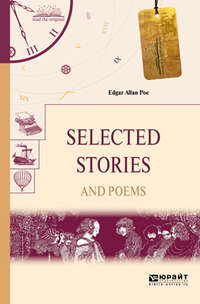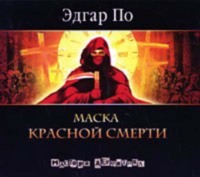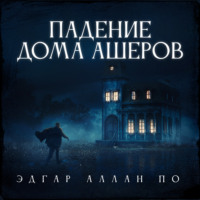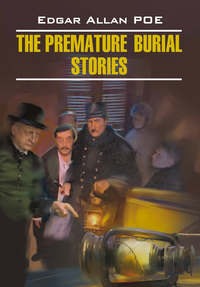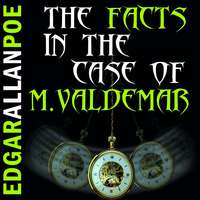 полная версия
полная версияThe Complete Stories of Edgar Allan Poe
Upon recovering, my first impulse of course was, to inform my friend of what I had seen and heard – and I can scarcely explain what feeling of repugnance it was, which, in the end, operated to prevent me.
At length, one evening, some three or four days after the occurrence, we were sitting together in the room in which I had seen the apparition – I occupying the same seat at the same window, and he lounging on a sofa near at hand. The association of the place and time impelled me to give him an account of the phenomenon. He heard me to the end – at first laughed heartily – and then lapsed into an excessively grave demeanor, as if my insanity was a thing beyond suspicion. At this instant I again had a distinct view of the monster – to which, with a shout of absolute terror, I now directed his attention. He looked eagerly – but maintained that he saw nothing – although I designated minutely the course of the creature, as it made its way down the naked face of the hill.
I was now immeasurably alarmed, for I considered the vision either as an omen of my death, or, worse, as the forerunner of an attack of mania. I threw myself passionately back in my chair, and for some moments buried my face in my hands. When I uncovered my eyes, the apparition was no longer visible.
My host, however, had in some degree resumed the calmness of his demeanor, and questioned me very rigorously in respect to the conformation of the visionary creature. When I had fully satisfied him on this head, he sighed deeply, as if relieved of some intolerable burden, and went on to talk, with what I thought a cruel calmness, of various points of speculative philosophy, which had heretofore formed subject of discussion between us. I remember his insisting very especially (among other things) upon the idea that the principle source of error in all human investigations, lay in the liability of the understanding to under-rate or to over-value the importance of an object, through mere misadmeasurement of its propinquity. “To estimate properly, for example,” he said, “the influence to be exercised on mankind at large by the thorough diffusion of Democracy, the distance of the epoch at which such diffusion may possibly be accomplished, should not fail to form an item in the estimate. Yet can you tell me one writer on the subject of government, who has ever thought this particular branch of the subject worthy of discussion at all?”
He here paused for a moment, stepped to a book-case, and brought forth one of the ordinary synopses of Natural History. Requesting me then to exchange seats with him, that he might the better distinguish the fine print of the volume, he took my arm-chair at the window, and, opening the book, resumed his discourse very much in the same tone as before.
“But for your exceeding minuteness,” he said, “in describing the monster, I might never have had it in my power to demonstrate to you what it was. In the first place, let me read to you a schoolboy account of the genus Sphinx, of the family Crepuscularia, of the order Lepidoptera, of the class of Insecta – or insects. The account runs thus:
” ‘Four membranous wings covered with little colored scales of a metallic appearance; mouth forming a rolled proboscis, produced by an elongation of the jaws, upon the sides of which are found the rudiments of mandibles and downy palpi; the inferior wings retained to the superior by a stiff hair; antennæ in the form of an elongated club, prismatic; abdomen pointed. The Death’sheaded Sphinx has occasioned much terror among the vulgar, at times, by the melancholy kind of cry which it utters, and the insignia of death which it wears upon its corslet.’ “
He here closed the book and leaned forward in the chair, placing himself accurately in the position which I had occupied at the moment of beholding “the monster.”
“Ah, here it is!” he presently exclaimed – “it is reascending the face of the hill, and a very remarkable looking creature, I admit it to be. Still, it is by no means so large or so distant as you imagined it; for the fact is that, as it wriggles its way up this thread, which some spider has wrought along the window-sash, I find it to be about the sixteenth of an inch in its extreme length, and also about the sixteenth of an inch distant from the pupil of my eye.”
THE END
The Cask of Amontillado (1846)
The thousand injuries of Fortunato I had borne as I best could; but when he ventured upon insult, I vowed revenge. You, who so well know the nature of my soul, will not suppose, however, that I gave utterance to a threat. At length I would be avenged; this was a point definitively settled – but the very definitiveness with which it was resolved, precluded the idea of risk. I must not only punish, but punish with impunity. A wrong is unredressed when retribution overtakes its redresser. It is equally unredressed when the avenger fails to make himself felt as such to him who has done the wrong.
It must be understood, that neither by word nor deed had I given Fortunato cause to doubt my good will. I continued, as was my wont, to smile in his face, and he did not perceive that my smile now was at the thought of his immolation.
He had a weak point – this Fortunato – although in other regards he was a man to be respected and even feared. He prided himself on his connoisseurship in wine. Few Italians have the true virtuoso spirit. For the most part their enthusiasm is adopted to suit the time and opportunity – to practise imposture upon the British and Austrian millionaires. In painting and gemmary, Fortunato, like his countrymen, was a quack – but in the matter of old wines he was sincere. In this respect I did not differ from him materially: I was skilful in the Italian vintages myself, and bought largely whenever I could.
It was about dusk, one evening during the supreme madness of the carnival season, that I encountered my friend. He accosted me with excessive warmth, for he had been drinking much. The man wore motley. He had on a tight-fitting parti-striped dress, and his head was surmounted by the conical cap and bells. I was so pleased to see him, that I thought I should never have done wringing his hand.
I said to him – “My dear Fortunato, you are luckily met. How remarkably well you are looking to-day! But I have received a pipe of what passes for Amontillado, and I have my doubts.”
“How?” said he. “Amontillado? A pipe? Impossible! And in the middle of the carnival!”
“I have my doubts,” I replied; “and I was silly enough to pay the full Amontillado price without consulting you in the matter. You were not to be found, and I was fearful of losing a bargain.”
“Amontillado!”
“I have my doubts.”
“Amontillado!”
“And I must satisfy them.”
“Amontillado!”
“As you are engaged, I am on my way to Luchesi. If any one has a critical turn, it is he. He will tell me —”
“Luchesi cannot tell Amontillado from Sherry.”
“And yet some fools will have it that his taste is a match for your own.”
“Come, let us go.”
“Whither?”
“To your vaults.”
“My friend, no; I will not impose upon your good nature. I perceive you have an engagement. Luchesi —”
“I have no engagement; – come.”
“My friend, no. It is not the engagement, but the severe cold with which I perceive you are afflicted. The vaults are insufferably damp. They are encrusted with nitre.”
“Let us go, nevertheless. The cold is merely nothing. Amontillado! You have been imposed upon. And as for Luchesi, he cannot distinguish Sherry from Amontillado.”
Thus speaking, Fortunato possessed himself of my arm. Putting on a mask of black silk, and drawing a roquelaire closely about my person, I suffered him to hurry me to my palazzo.
There were no attendants at home; they had absconded to make merry in honor of the time. I had told them that I should not return until the morning, and had given them explicit orders not to stir from the house. These orders were sufficient, I well knew, to insure their immediate disappearance, one and all, as soon as my back was turned.
I took from their sconces two flambeaux, and giving one to Fortunato, bowed him through several suites of rooms to the archway that led into the vaults. I passed down a long and winding staircase, requesting him to be cautious as he followed. We came at length to the foot of the descent, and stood together on the damp ground of the catacombs of the Montresors.
The gait of my friend was unsteady, and the bells upon his cap jingled as he strode.
“The pipe,” said he.
“It is farther on,” said I; “but observe the white web-work which gleams from these cavern walls.”
He turned towards me, and looked into my eyes with two filmy orbs that distilled the rheum of intoxication.
“Nitre?” he asked, at length.
“Nitre,” I replied. “How long have you had that cough?”
“Ugh! ugh! ugh! – ugh! ugh! ugh! – ugh! ugh! ugh! – ugh! ugh! ugh! – ugh! ugh! ugh!”
My poor friend found it impossible to reply for many minutes.
“It is nothing,” he said, at last.
“Come,” I said, with decision, “we will go back; your health is precious. You are rich, respected, admired, beloved; you are happy, as once I was. You are a man to be missed. For me it is no matter. We will go back; you will be ill, and I cannot be responsible. Besides, there is Luchesi —”
“Enough,” he said; “the cough is a mere nothing; it will not kill me. I shall not die of a cough.”
“True – true,” I replied; “and, indeed, I had no intention of alarming you unnecessarily – but you should use all proper caution. A draught of this Medoc will defend us from the damps.”
Here I knocked off the neck of a bottle which I drew from a long row of its fellows that lay upon the mould.
“Drink,” I said, presenting him the wine.
He raised it to his lips with a leer. He paused and nodded to me familiarly, while his bells jingled.
“I drink,” he said, “to the buried that repose around us.”
“And I to your long life.”
He again took my arm, and we proceeded.
“These vaults,” he said, “are extensive.”
“The Montresors,” I replied, “were a great and numerous family.”
“I forget your arms.”
“A huge human foot d’or, in a field azure; the foot crushes a serpent rampant whose fangs are imbedded in the heel.”
“And the motto?”
“Nemo me impune lacessit.”
“Good!” he said.
The wine sparkled in his eyes and the bells jingled. My own fancy grew warm with the Medoc. We had passed through walls of piled bones, with casks and puncheons intermingling, into the inmost recesses of the catacombs. I paused again, and this time I made bold to seize Fortunato by an arm above the elbow.
“The nitre!” I said: “see, it increases. It hangs like moss upon the vaults. We are below the river’s bed. The drops of moisture trickle among the bones. Come, we will go back ere it is too late. Your cough —”
“It is nothing,” he said; “let us go on. But first, another draught of the Medoc.”
I broke and reached him a flacon of De Grâve. He emptied it at a breath. His eyes flashed with a fierce light. He laughed and threw the bottle upwards with a gesticulation I did not understand.
I looked at him in surprise. He repeated the movement – a grotesque one.
“You do not comprehend?” he said.
“Not I,” I replied.
“Then you are not of the brotherhood.”
“How?”
“You are not of the masons.”
“Yes, yes,” I said, “yes, yes.”
“You? Impossible! A mason?”
“A mason,” I replied.
“A sign,” he said.
“It is this,” I answered, producing a trowel from beneath the folds of my roquelaire.
“You jest,” he exclaimed, recoiling a few paces. “But let us proceed to the Amontillado.”
“Be it so,” I said, replacing the tool beneath the cloak, and again offering him my arm. He leaned upon it heavily. We continued our route in search of the Amontillado. We passed through a range of low arches, descended, passed on, and descending again, arrived at a deep crypt, in which the foulness of the air caused our flambeaux rather to glow than flame.
At the most remote end of the crypt there appeared another less spacious. Its walls had been lined with human remains, piled to the vault overhead, in the fashion of the great catacombs of Paris. Three sides of this interior crypt were still ornamented in this manner. From the fourth the bones had been thrown down, and lay promiscuously upon the earth, forming at one point a mound of some size. Within the wall thus exposed by the displacing of the bones, we perceived a still interior recess, in depth about four feet, in width three, in height six or seven. It seemed to have been constructed for no especial use in itself, but formed merely the interval between two of the colossal supports of the roof of the catacombs, and was backed by one of their circumscribing walls of solid granite.
It was in vain that Fortunato, uplifting his dull torch, endeavored to pry into the depths of the recess. Its termination the feeble light did not enable us to see.
“Proceed,” I said; “herein is the Amontillado. As for Luchesi —”
“He is an ignoramus,” interrupted my friend, as he stepped unsteadily forward, while I followed immediately at his heels. In an instant he had reached the extremity of the niche, and finding his progress arrested by the rock, stood stupidly bewildered. A moment more and I had fettered him to the granite. In its surface were two iron staples, distant from each other about two feet, horizontally. From one of these depended a short chain, from the other a padlock. Throwing the links about his waist, it was but the work of a few seconds to secure it. He was too much astounded to resist. Withdrawing the key I stepped back from the recess.
“Pass your hand,” I said, “over the wall; you cannot help feeling the nitre. Indeed it is very damp. Once more let me implore you to return. No? Then I must positively leave you. But I must first render you all the little attentions in my power.”
“The Amontillado!” ejaculated my friend, not yet recovered from his astonishment.
“True,” I replied; “the Amontillado.”
As I said these words I busied myself among the pile of bones of which I have before spoken. Throwing them aside, I soon uncovered a quantity of building stone and mortar. With these materials and with the aid of my trowel, I began vigorously to wall up the entrance of the niche.
I had scarcely laid the first tier of my masonry when I discovered that the intoxication of Fortunato had in a great measure worn off. The earliest indication I had of this was a low moaning cry from the depth of the recess. It was not the cry of a drunken man. There was then a long and obstinate silence. I laid the second tier, and the third, and the fourth; and then I heard the furious vibrations of the chain. The noise lasted for several minutes, during which, that I might hearken to it with the more satisfaction, I ceased my labors and sat down upon the bones. When at last the clanking subsided, I resumed the trowel, and finished without interruption the fifth, the sixth, and the seventh tier. The wall was now nearly upon a level with my breast. I again paused, and holding the flambeaux over the mason-work, threw a few feeble rays upon the figure within.
A succession of loud and shrill screams, bursting suddenly from the throat of the chained form, seemed to thrust me violently back. For a brief moment I hesitated – I trembled. Unsheathing my rapier, I began to grope with it about the recess: but the thought of an instant reassured me. I placed my hand upon the solid fabric of the catacombs, and felt satisfied. I reapproached the wall. I replied to the yells of him who clamored. I re-echoed – I aided – I surpassed them in volume and in strength. I did this, and the clamorer grew still.
It was now midnight, and my task was drawing to a close. I had completed the eighth, the ninth, and the tenth tier. I had finished a portion of the last and the eleventh; there remained but a single stone to be fitted and plastered in. I struggled with its weight; I placed it partially in its destined position. But now there came from out the niche a low laugh that erected the hairs upon my head. It was succeeded by a sad voice, which I had difficulty in recognising as that of the noble Fortunato. The voice said —“Ha! ha! ha! – he! he! – a very good joke indeed – an excellent jest. We will have many a rich laugh about it at the palazzo – he! he! he! – over our wine – he! he! he!”
“The Amontillado!” I said.
“He! he! he! – he! he! he! – yes, the Amontillado. But is it not getting late? Will not they be awaiting us at the palazzo, the Lady Fortunato and the rest? Let us be gone.”
“Yes,” I said, “let us be gone.”
“For the love of God, Montressor!”
“Yes,” I said, “for the love of God!”
But to these words I hearkened in vain for a reply. I grew impatient. I called aloud —“Fortunato!”
No answer. I called again —
“Fortunato!”
No answer still. I thrust a torch through the remaining aperture and let it fall within. There came forth in return only a jingling of the bells. My heart grew sick – on account of the dampness of the catacombs. I hastened to make an end of my labor. I forced the last stone into its position; I plastered it up. Against the new masonry I reerected the old rampart of bones. For the half of a century no mortal has disturbed them. In pace requiescat!
THE END
Landor’s Cottage (1850)
A Pendant To “The Domain Of Arnheim”
During a pedestrian tour last summer, through one or two of the river counties of New York, I found myself, as the day declined, somewhat embarrassed about the road I was pursuing. The land undulated very remarkably; and my path, for the last hour, had wound about and about so confusedly, in its effort to keep in the valleys, that I no longer knew in what direction lay the sweet village of B—, where I had determined to stop for the night. The sun had scarcely shone – strictly speaking – during the day, which nevertheless had been unpleasantly warm. A smoky mist, resembling that of the Indian summer, enveloped all things, and of course, added to my uncertainty. Not that I cared much about the matter. If I did not hit upon the village before sunset, or even before dark, it was more than possible that a little Dutch farmhouse, or something of that kind, would soon make its appearance – although, in fact, the neighborhood (perhaps on account of being more picturesque than fertile) was very sparsely inhabited. At all events, with my knapsack for a pillow, and my hound as a sentry, a bivouac in the open air was just the thing which would have amused me. I sauntered on, therefore, quite at ease – Ponto taking charge of my gun – until at length, just as I had begun to consider whether the numerous little glades that led hither and thither were intended to be paths at all, I was conducted by one of the most promising of them into an unquestionable carriage track. There could be no mistaking it. The traces of light wheels were evident; and although the tall shrubberies and overgrown undergrowth met overhead, there was no obstruction whatever below, even to the passage of a Virginian mountain wagon – the most aspiring vehicle, I take it, of its kind. The road, however, except in being open through the wood – if wood be not too weighty a name for such an assemblage of light trees – and except in the particulars of evident wheel-tracks – bore no resemblance to any road I had before seen. The tracks of which I speak were but faintly perceptible – having been impressed upon the firm, yet pleasantly moist surface of – what looked more like green Genoese velvet than anything else. It was grass, clearly – but grass such as we seldom see out of England – so short, so thick, so even, and so vivid in color. Not a single impediment lay in the wheel-route – not even a chip or dead twig. The stones that once obstructed the way had been carefully placed – not thrown – along the sides of the lane, so as to define its boundaries at bottom with a kind of half-precise, half-negligent, and wholly picturesque definition. Clumps of wild flowers grew everywhere, luxuriantly, in the interspaces.
What to make of all this, of course I knew not. Here was art undoubtedly – that did not surprise me – all roads, in the ordinary sense, are works of art; nor can I say that there was much to wonder at in the mere excess of art manifested; all that seemed to have been done, might have been done here – with such natural “capabilities” (as they have it in the books on Landscape Gardening) – with very little labor and expense. No; it was not the amount but the character of the art which caused me to take a seat on one of the blossomy stones and gaze up and down this fairy-like avenue for half an hour or more in bewildered admiration. One thing became more and more evident the longer I gazed: an artist, and one with a most scrupulous eye for form, had superintended all these arrangements. The greatest care had been taken to preserve a due medium between the neat and graceful on the one hand, and the pittoresque, in the true sense of the Italian term, on the other. There were few straight, and no long uninterrupted lines. The same effect of curvature or of color, appeared twice, usually, but not oftener, at any one point of view. Everywhere was variety in uniformity. It was a piece of “composition,” in which the most fastidiously critical taste could scarcely have suggested an emendation.
I had turned to the right as I entered this road, and now, arising, I continued in the same direction. The path was so serpentine, that at no moment could I trace its course for more than two or three paces in advance. Its character did not undergo any material change.
Presently the murmur of water fell gently upon my ear – and in a few moments afterwards, as I turned with the road somewhat more abruptly than hitherto, I became aware that a building of some kind lay at the foot of a gentle declivity just before me. I could see nothing distinctly on account of the mist which occupied all the little valley below. A gentle breeze, however, now arose, as the sun was about descending; and while I remained standing on the brow of the slope, the fog gradually became dissipated into wreaths, and so floated from over the scene.
As it came fully into view – thus gradually as I describe it – piece by piece, here a tree, there a glimpse of water, and here again the summit of a chimney, I could scarcely help fancying that the whole was one of the ingenious illusions sometimes exhibited under the name of “vanishing pictures.”
By the time, however, that the fog had thoroughly disappeared, the sun had made its way down behind the gentle hills, and thence, as if with a slight chassez to the south, had come again fully into sight; glaring with a purplish lustre through a chasm that entered the valley from the west. Suddenly, therefore – and as if by the hand of magic – this whole valley and every thing in it became brilliantly visible.
The first coup d’œil, as the sun slid into the position described, impressed me very much as I have been impressed when a boy, by the concluding scene of some well-arranged theatrical spectacle or melodrama. Not even the monstrosity of color was wanting; for the sunlight came out through the chasm, tinted all orange and purple; while the vivid green of the grass in the valley was reflected more or less upon all objects from the curtain of vapor that still hung overhead, as if loth to take its total departure from a scene so enchantingly beautiful.
The little vale into which I thus peered down from under the fog-canopy, could not have been more than four hundred yards long; while in breadth it varied from fifty to one hundred and fifty, or perhaps two hundred. It was most narrow at its northern extremity, opening out as it tended southwardly, but with no very precise regularity. The widest portion was within eighty yards of the southern extreme. The slopes which encompassed the vale could not fairly be called hills, unless at their northern face. Here a precipitous ledge of granite arose to a height of some ninety feet; and, as I have mentioned, the valley at this point was not more than fifty feet wide; but as the visiter proceeded southwardly from the cliff, he found on his right hand and on his left, declivities at once less high, less precipitous, and less rocky. All, in a word, sloped and softened to the south; and yet the whole vale was engirdled by eminences, more or less high, except at two points. One of these I have already spoken of. It lay considerably to the north of west, and was where the setting sun made its way, as I have before described, into the amphitheatre, through a cleanly cut natural cleft in the granite embankment: this fissure might have been ten yards wide at its widest point, so far as the eye could trace it. It seemed to lead up, up, like a natural causeway, into the recesses of unexplored mountains and forests. The other opening was directly at the southern end of the vale. Here, generally, the slopes were nothing more than gentle inclinations, extending from east to west about one hundred and fifty yards. In the middle of this extent was a depression, level with the ordinary floor of the valley. As regards vegetation, as well as in respect to every thing else, the scene softened and sloped to the south. To the north – on the craggy precipice – a few paces from the verge – up sprang the magnificent trunks of numerous hickories, black walnuts, and chestnuts, interspersed with occasional oak; and the strong lateral branches thrown out by the walnuts especially, spread far over the edge of the cliff. Proceeding southwardly, the explorer saw, at first, the same class of trees, but less and less lofty and Salvatorish in character; then he saw the gentler elm, succeeded by the sassafras and locust – these again by the softer linden, red-bud, catalpa, and maple – these yet again by still more graceful and more modest varieties. The whole face of the southern declivity was covered with wild shrubbery alone – an occasional silver willow or white poplar excepted. In the bottom of the valley itself – (for it must be borne in mind that the vegetation hitherto mentioned grew only on the cliffs or hill-sides) – were to be seen three insulated trees. One was an elm of fine size and exquisite form: it stood guard over the southern gate of the vale. Another was a hickory, much larger than the elm, and altogether a much finer tree, although both were exceedingly beautiful: it seemed to have taken charge of the north-western entrance, springing from a group of rocks in the very jaws of the ravine, and throwing its graceful body, at an angle of nearly forty-five degrees, far out into the sunshine of the amphitheatre. About thirty yards east of this tree stood, however, the pride of the valley, and beyond all question the most magnificent tree I have ever seen, unless, perhaps, among the cypresses of the Itchiatuckanee. It was a triple-stemmed tulip-tree – the Liriodendron Tulipiferum – one of the natural order of magnolias. Its three trunks separated from the parent at about three feet from the soil, and diverging very slightly and gradually, were not more than four feet apart at the point where the largest stem shot out into foliage: this was at an elevation of about eighty feet. The whole height of the principal division was one hundred and twenty feet. Nothing can surpass in beauty the form, or the glossy, vivid green of the leaves of the tulip-tree. In the present instance they were fully eight inches wide; but their glory was altogether eclipsed by the gorgeous splendor of the profuse blossoms. Conceive, closely congregated, a million of the largest and most resplendent tulips! Only thus can the reader get any idea of the picture I would convey. And then the stately grace of the clean, delicately-granulated columnar stems, the largest four feet in diameter, at twenty from the ground. The innumerable blossoms, mingling with those of other trees scarcely less beautiful, although infinitely less majestic, filled the valley with more than Arabian perfumes.



